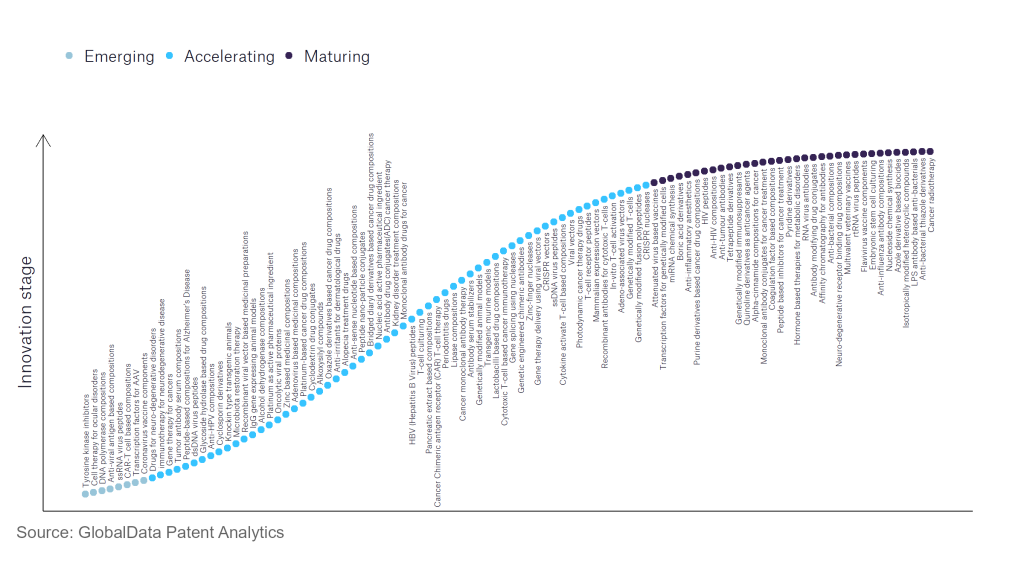The pharmaceutical industry continues to be a hotbed of innovation, with activity driven by the evolution of new treatment paradigms, and the gravity of unmet need, as well as the growing importance of technologies such as pharmacogenomics, digital therapeutics, and artificial intelligence. In the last three years alone, there have been over 633,000 patents filed and granted in the pharmaceutical industry, according to GlobalData’s report on Innovation in Pharmaceuticals: Affinity chromatography for antibodies. Buy the report here.

Discover B2B Marketing That Performs
Combine business intelligence and editorial excellence to reach engaged professionals across 36 leading media platforms.
However, not all innovations are equal and nor do they follow a constant upward trend. Instead, their evolution takes the form of an S-shaped curve that reflects their typical lifecycle from early emergence to accelerating adoption, before finally stabilising and reaching maturity.
Identifying where a particular innovation is on this journey, especially those that are in the emerging and accelerating stages, is essential for understanding their current level of adoption and the likely future trajectory and impact they will have.
110 innovations will shape the pharmaceutical industry
According to GlobalData’s Technology Foresights, which plots the S-curve for the pharmaceutical industry using innovation intensity models built on over 756,000 patents, there are 110 innovation areas that will shape the future of the industry.
Within the emerging innovation stage, DNA polymerase compositions and coronavirus vaccine components, are disruptive technologies that are in the early stages of application and should be tracked closely. Viral vectors, and CRISPR vector are some of the accelerating innovation areas, where adoption has been steadily increasing. Among maturing innovation areas are antibody modifying drug conjugate and anti-tumour antibodies, which are now well established in the industry.
Innovation S-curve for the pharmaceutical industry

Affinity chromatography for antibodies is a key innovation area in pharmaceutical
Antibody purification involves the extraction of selective antibodies from a variety of polyclonal antibodies samples such as serum and monoclonal antibodies samples such as hybridoma cell line. Affinity chromatography is a highly efficient antibody purification technique owing to its precision and quick purification. Chromatographic matrix contains ligand which interacts with the specific region of antibody fragments. Purification of antibody fragments depend upon this ligand-fragment interaction.
GlobalData’s analysis also uncovers the companies at the forefront of each innovation area and assesses the potential reach and impact of their patenting activity across different applications and geographies. According to GlobalData, there are 70+ companies, spanning technology vendors, established pharmaceutical companies, and up-and-coming start-ups engaged in the development and application of affinity chromatography for antibodies.
Key players in affinity chromatography for antibodies – a disruptive innovation in the pharmaceutical industry
‘Application diversity’ measures the number of different applications identified for each relevant patent and broadly splits companies into either ‘niche’ or ‘diversified’ innovators.
‘Geographic reach’ refers to the number of different countries each relevant patent is registered in and reflects the breadth of geographic application intended, ranging from ‘global’ to ‘local’.
Merck is a global science and technology company, a completely integrated service organisation that supports CDMO and contract testing across conventional and innovative modalities. The company provides best-in-class products for pharmaceutical development and production, and one of the widest portfolios in the industry for scientists. One of the top three businesses, Merck Millipore, produces protein A, Affinity chromatography resins that are extensively employed in the industrial manufacturing of therapeutic monoclonal antibodies in the US. Affinity resins from Merck are exceptionally well suited for large-scale purification and are created for efficient, high throughput purification of monoclonal, polyclonal, and engineered antibodies. Eshmuno A resin, ProSep Ultra Plus resin, ProSep-vA High Capacity resin, and ProSep-vA Ultra resin are a few examples of Merck's resins.
To further understand the key themes and technologies disrupting the pharmaceutical industry, access GlobalData’s latest thematic research report on Pharmaceutical.
Data Insights
From

The gold standard of business intelligence.
Blending expert knowledge with cutting-edge technology, GlobalData’s unrivalled proprietary data will enable you to decode what’s happening in your market. You can make better informed decisions and gain a future-proof advantage over your competitors.



